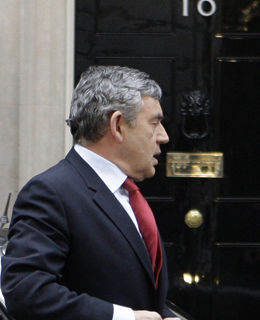
British Prime Minister Gordon Brown arrives at Downing Street in London on Friday, May 7, 2010
On May 7, many Britons woke up to a hung Parliament for the first time ever. Not since 1974 had the U.K. faced such a scenario, which came about because no single party won 326 seats, the magic number needed to hold a majority in the House of Commons. While David Cameron's Conservative Party achieved both the most votes (close to 11 million) and the most seats (306), political uncertainty ruled the day.
Cameron, as well as Labour Prime Minister Gordon Brown and Liberal Democrat leader Nick Clegg, all reached out to one another on Friday, May 8, to resolve the situation. Clegg got the ball rolling, maintaining that the Conservatives had earned the "first right" to try to gather enough support from smaller parties to form a government in the "national interest." Then Cameron reached out to the Lib Dems, stating he wanted to make a "big, open and comprehensive offer." Brown followed by saying he'd be "willing to see any of the party leaders," before adding, "Should the discussions between Mr. Cameron and Mr. Clegg come to nothing ... I would be prepared to discuss with Mr. Clegg the areas where there may be some measure of agreement between our two parties." It was all a far cry from their posturing during the campaign, when the leaders were reticent to even acknowledge that they would be prepared to deal with each other in the event of a hung Parliament.